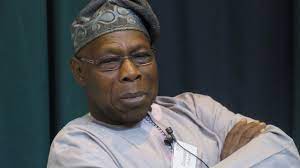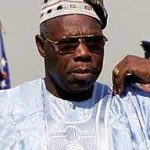“Anybody who tests the will of this administration… will curse the day he was born”-Olusegun Obasanjo
I spent the last part of the last week in Kano, attending the two-day international conference on Nigeria’s Democratic Development, 1999-2007: Trends, Problems, Challenges and Prospects, organized by the Centre for Democratic Research and Training, Mambaya House of the Bayero University Kano. It was a well attended conference,and very many thought-provoking papers were presented, on various aspects of the democratic development, or lack of it, of the past eight years in Nigeria.
All the participants at the conference had come against the background of the serious deformities of the democratic process in Nigeria, and the general feeling of apprehension in the country, as the country lurches towards the elections of April 2007, rather like a blind-folded individual caught at the edge of the precipice. Nigeria is going through one of its most difficult phases of it’s development, largely as a result of the desperacy of an out going president, whose actions and utterances, betray clear symptoms of lunacy, at a time when the nation needs temperance and assurance that the transition project was sincerely worked out to achieve a consolidation of the democratic process.
Practically every paper presented at the conference had a strain of deep-seated cynism running through it, in respect of the way that the political elite have handled the affairs of the country over the past eight years. I will not use a few of the papers to illustrate how the scholars see the evolution of Nigerian political society in the past eight years. Professor Adele Jinadu, the eminence grise of radical scholarship in Nigerian political science presented a keynote address, which talked of “foreboding sign posts” in Nigerian democracy; “contraditctions which press hard on the country and require pressing attention”.
Professor Adele Jinadu argued further that the dominant political culture in our country actually “depoliticizes politics reducing it to a lawless vocation”. The country is caught deep in a crisis, which he said is best characterized as “the massive problem of the structural violence, institutionalized inequities, some of the worst social indicators in the world, made unconscionable when juxtaposed against excessive, even criminial wealth in a few hands; authoritarian and kleptocratic rule, not to forget a “creeping imperial executive rule’.
In a related vein, Professor Bjorn Beckham, of the Department of Political Science of the Stockholm University in Sweden,who taught at the Ahmadu Bello University during the 1970s and 1980s, also posited that Nigerian ruling class politics “continues to slide more deeply into political crisis,becoming more illegitimate than ever”.This is due to the failure of the ruling class to address the problems of democracy and national development “ in a credible manner” in his words.However, ‘that in itself is not new. It has happened before”.
Professor Beckham says that the gap between Nigeria’s bourgeoisie and the people keep growing, and that gap finds reflection at the level of ruling class politics; its claims are hollow, becomes increasingly de-legitimized and therefore it lacks credibility. He reminds that one of the most interesting elements of the problems we are faced with today, is that as far back as 1961, Frantz Fanon had underscored the uselessness of the African bourgeoisie, with a prescient insight, given that at that time, there was much in terms pf post-colonial experience to draw upon, to be able to make a very general conclusion about the development of our societies, and the propensities of the ruling class.
Doctor Sabo Bako of the Department of Political Science of the Ahmadu Bello University, Zaria, presented a paper he titled “The Rise and Consolidation of Garrison Democracy in Nigeria, 1999-2007”. The central plank of his paper being that Nigeria’s democratization has faced a systematic reversal and consolidation of authoritarianism. He attributes this to “the social fragility and economic dislocation of the emerging civilian democratic forces in contradiction to the robust military oligarchy, which has now penetrated and dominated virtually all the economic, social and political sectors in the society”.
Doctor Bako argued that instead of an evolution or a consolidation of democracy, what Nigeria has witness in the past eight years, is “the triumphant entry and consolidation of the garrison democracy”. He went further, that garrison democracy is only democratic in form and appellation; but in essence and reality, it actually trivializes and even repudiates the minimum conditions for democratic processes, laws, values and institutions, leading to the unprecedented contraction of the democratic space in Nigeria during the past eight years.
From this standpoint, garrison democracy cannot be divorced from “ the process of the militarism and militarization of the transition to democracy by military rule which have impacted on being shaped by the character of democratization process here. The effects of the military rule have gone beyond the military regime to the in-coming civilian regime and its whole gamut of governance”. There follows fom the analysis,an itemization of the central planks of garrison democracy, which all Nigerians will recognize, over the eight years of Obasanjo’s presidency.
Number one is the “concentration and centralization of powers in the hands of the president who now acts as the Grand National Commander of the Nigerian State in conduct of its business and affairs”. Obasanjo has succeded in imposing a highly centralized authoritarian structure on the democratic process, with the consequence of a pesonilization of power leading to the emergence of the “most authoritarian history of the country. The president (has) concentrated and exercised powers far beyond all the previous military regimes and colonial administration”.
The second element and consequences of garrison democracy is “ the usurpation of powers of the organs of state and institutions of democracy in the country’’. Related to this is that an unelected cabal drawn from Obasanjo’s immediate family, “military, technocracy, bureaucracy, business community and the underworld has all the powers by calling the shot, and running the business of government above the elected representatives”.
It is also an attribute of garrison democracy it “deinstitutionalizes” the political party system and “blocks the autonomous development and condolidation” of the nation’s political system. The party system is underdeveloped and literally useless as vehicles of political mobilization or platforms of power. Similarly, the various parliamentary bodies are being ursurped, bribed or intimidated in the spirit of garrison control.
Garrison democracy also “trivializes the electoral process”, with its proponents unable to organize credible elections and are mot disposed towards its actualization. “The garrison democrats do not believe in elections as a way of choosing people’s respresentatives but an ideologyfor legitimizing stolen mandate”.
Garrison democracy is also an elaborate platform of theft, fraud and “conversion of public funds and assests and property into personal possession of the grand garrison commander and cabal through looting and dubious privatization progarmme”. The garrison regime is also the most subservient to imperialism in the history of Nigeria. Obasanjo behaves like a sheepish school bo, when in the presence of the representatives of the imperialist powers, and it is on record that nearly every aspect of our national life, from the economy to defence, have been handed over to the dictates of imperialism.
It is implicit in the practice of garrison democracy, to exploit the mechanism of divide and rule amongst the Nigerian people and use and dump within the elite, to hold on to power. The Obasanjo cabal has supported or exploited “ the highest and bloodiest ethnic, religious, regional and geopolitical conflicts in the histoty of Nigeria. It has broken the constitutional breaches of federal character provision beyond recognition. The regime has deeply ethicized the federal civil service through poen sectionalist recruitment and rationalizations and also discriminated citing of federal projects. The country has never so divied along ethnic and regional and religious lines including the civil war period as under the garrison democracy led by president Obasanjo.
The garrison democracy regime employs the instruments of state power to sponsor or abet violence, political assassination, systematic abuse of human rights and the freedom of Nigerians as individuals or in communities. State sponsored, extra-judicial executions have been documented in the eight years of the regime, a regime that has also entered history as the “most lawless regime in terms of breaking the national constitution, in which it is said to have committed over 150 impeachable offences between 1999 and 2007”.
You would have noticed that I have quoted very extensively from the characterizations of garrison democracy today. This is because it is vital to lay bare what we have experienced in the past eight years, under the regime of General Olusegun Obasanjo in order to give an indication of the job that we have on our hands, in the immediate future. What is playing out today in institute their garrison command as the only option of development available to Nigerians and acceptable to them, and on the other hand, a growing movement to institute agenuinely democratic and patriotic system built on the real interests of the Nigerian people.
Recent events have shown that garrison democracy rests on a number of pillars; at the top is Obasanjo as the commander-in-chief of the garrison forces and ‘ founder, laeder and father’ of garrison democracy; this throne perches on an ideological platform which is run by the “thinkers” such as Nasir el-Rufai, Oby Ezekweseli, Charles Soludo, those who have converted to ‘religion’ of capitalist neo-liberalism, whose ‘church’ headquarters is in Washington and whose doctrines have been written from the IMF,Worls Bank and the American Treasury Department, and doled out through short courses (often no longer than 3months at a time) at Harvard Business School on the Kennedy School of Government. Then there is the economics arm, run by Dangote, Femi Otedola, Jim Ovia and Ndidi Onyuike the so-called Transcorp capitalists. This is the political idealogical and economic base of the garrison democracy which has taken hold of Nigeria in the eight years of the unpatriotic anti-people and illegitimate regime of General Olusegun Obasanjo. It has been very lucrative for them, and its no wonder that the felon and ex-conconvict Olusegun Obasanjo, who was reported to have less than twenty thousand naira in his bank account in 1999, and who needed Atiku Abubakar and others to pay off a debt of over N100million to stave off bankruptcy has now reportedly become a multi-billionaire with interests in banking, oil industry, farms, secondary schools and university not to talk of the shares in TRANSCORP, the vehicle used to alienate some of our choice national assets.
If the Nigerian people must defeat garrison democracy, we need to understand the nature of the forces that profit from garrison democracy and in whose interest Obasanjo wants consolidation. It is the redoubt within which garrison democracy has been incubated and is the platform that the Obasanjo clique is using to tighten the screws of authoritarianism and dictatorship, the anti-people economics policies of neo-liberalism capitalism and the surrender of our nation’s sovereignty politics, economy and defence policies, to imperialism. The past eight years have shown the ugly features of garrison democracy and the ways it has distorted/emasculated democracy; it is a system of dictatorship and systematic entrenchment of illegalities in the nation’s political economy and we want an end to the garrison democracy: if we desire can economy which works for the Nigerian people, notbone that dubiously hands over our country’s asset to Obasanjo and a few people around him, then, we must uproot very decisively garrison democracy soon. Whoever wins the next elections, where Umar Yar’ Adua, Atiku Abubakar, Muhammadu Buhari or even Attahiru Bafarawa would face the uncomfortable choice for either working to consolidate garrison democracy or working for the Nigerian people.
The choice is either to consolidate the worstexcessesive garrison democracy and through that depen the suffering of the Nigerian People or to work for the Nigerian people and deepening of our democratic process. Whoever wins in ANPP must make a choice between these two platforms.


